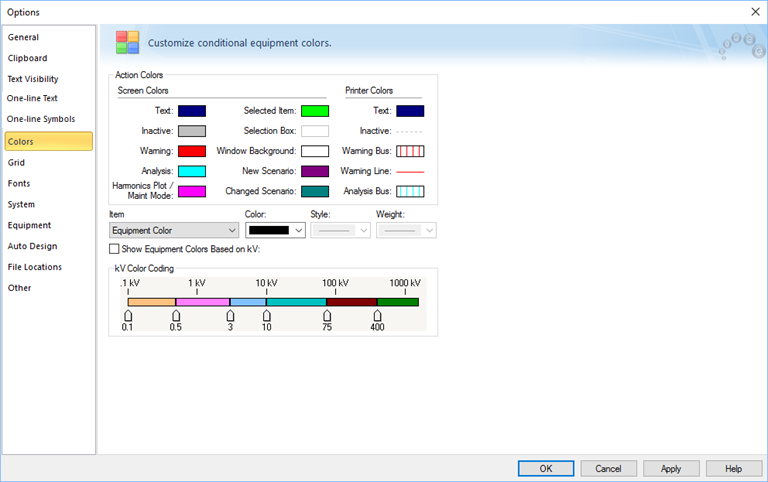Colors Tab
EasyPower's customizable options are set up under Tools > Options.
The Colors tab lets you change the appearance of the screen and printer elements. This dialog box has three sections:
- Screen Colors
- Printer Colors
- Equipment Colors Based on kV.

Figure 1: Colors tab of Options Dialog Box
Most colors can be changed independently for the screen and printer, accounting for the fact that color printers sometimes do not render screen colors very well.
To change color of any item, click the box showing the current color format. In the color palette that appears, select the desired color and click Apply. The changes take place immediately. You can change the color of other items using the Apply button. Click OK when you have the colors you want.
You can also change the colors by selecting the item you want to format using the pull down menu. Select the Color, Style (pattern/shade) and Weight (thickness of lines).

Figure 2: Equipment Color Selection
The equipment color selected will be the default equipment color for all equipment unless the Equipment Color Based on kV feature is selected. Also, if any particular equipment has been formatted with a certain color, then this color applies regardless of the default color.
|
Option
|
Description
|
|
Screen Colors
For screen appearance, the style and weight options are unavailable.
|
|
Text
|
This is used set the color of the text on the one-line, such as item ID text or analysis results.
|
|
Inactive
|
The color of an item turned off by selecting Deactivate  . .
|
|
Warning
|
This is the color used to show that something is lacking or wrong with a particular item. The exact meaning is context-specific. For example, in Database Edit focus it means either the item is not fully connected or the item's data is incomplete. In Short Circuit focus, it could mean that a breaker is being overloaded.
|
|
Analysis
|
This color is most commonly used for buses that have been faulted in a short circuit analysis or buses at which harmonics injected during harmonics analysis.
|
|
Harmonics Plot
|
To select the color of harmonics plots in Define Plot.
|
|
Selected Item
|
When you select an item by clicking on it, enclosing it in a rectangle, or finding it by selecting  Find, it is displayed in this color. Find, it is displayed in this color.
|
|
Selection box
|
This enables you to change the selection box color on your screen.
|
|
Window Background
|
Set the color of the background of the screen in the one-line.
|
|
New Scenario
|
While in a scenario, any new items are indicated with this color.
|
|
Changed Scenario
|
While in a scenario, any equipment data or location changes are indicated by this color.
|
|
Printer Colors
For printer output, the style (pattern/shade) and/or weight options also can be selected in addition to the color.
|
|
Text
|
This color is used for text on the one-line, such as for item ID text or analysis results.
|
|
Inactive Color
|
The color of an item turned off by selecting  Deactivate. Deactivate.
|
|
Warning Color
|
This is the color used to show that something is lacking or wrong with a particular item. The exact meaning is context-specific. For example, in Database Edit focus it means either the item is not fully connected or the item's data is incomplete. In Short Circuit focus, it could mean that a breaker is being overloaded.
|
| Warning Bus
|
Buses that are highlighted (such as to show which buses are faulted or have a violation) can be given a pattern that makes them distinguishable from non-highlighted buses. This is especially useful on monochrome printers like the HP LaserJet.
|
| Warning Line
|
Non-bus items that are highlighted (such as to show line end faults or equipment duty violations) can be printed bolder to make them distinguishable from non-highlighted items. This is especially useful on monochrome printers like the HP LaserJet.
|
|
Analysis Bus
|
This color is most commonly used for buses that have been faulted in a short circuit analysis or buses at which harmonics injected during harmonics analysis.
|
Equipment Colors Based on kV
Drag the sliders to adjust the range of kV the color code represents.

Figure 3: Slider
To display the equipment colors based on kV, select check box. If you turn this feature off the default equipment colors are used. As shown in the figure above, the color codes for different kV ranges and sliders representing the boundary kV of the color code enable you to set the color for desired voltage ranges. You can drag each slider to the left and right to set the boundary voltage for any kV range. The kV value appears below each slider depending on the position of the slider relative to the kV scale.
To change the color for any range of voltage, left-click on the color in the range. A color palette appears where you can select the color you want.
Note: To avoid confusion, make sure that the equipment color is not the same as the warning or analysis color.
More Information




